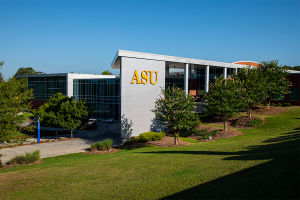Albany State University Continues to Make Major Impact on Southwest Georgia Economy
Albany State University's (ASU) impact on the region’s economy continues to be strong, providing a critical source of jobs and revenue that impact Albany, Dougherty County, and the southwest region.
From July 2021 through June 30, 2022, ASU added more than $260 million to the southwest
region, an increase of approximately 12.7% over the previous year. The University
provided employment in the region of 2,588 jobs, including on-campus positions and
services directly related to the institution. This was an astounding increase of
over 13% from the previous fiscal year. 
During the Fall 2022 semester, ASU had an enrollment of 6,358 students, also an increase from the previous year, while conferring 1,448 degrees during the 2022 academic year. Those graduating students will further impact the economy of the southwest region and the state of Georgia overall. Last year, Albany State was one of only three USG Institutions with increased enrollment and expects another increase for the 2023/2024 school year.
“The recent report demonstrates Albany State University’s continued vital impact on the economy of the Southwest Georgia region. Our commitment to the region's growth will continue as we focus on the tenets of our strategic plan to increase enrollment, expand economic partnerships, and provide enriching services to the community,” said ASU President Marion Ross Fedrick. “Our faculty, staff, and students are proud to be members of the local community that contribute to the region’s economic engine, and we look forward to a robust 2024.”
The University System of Georgia and the Board of Regents commission the Selig Center for Economic Growth at the University of Georgia’s, Terry College of Business, annually to conduct the economic impact study of the entire USG system. The study shows that the system contributed $20.1 billion and 159,034 jobs to Georgia’s economy. Approximately 32% of these positions are on-campus jobs and 68% are off-campus, meaning that for every job created by a USG institution, two are added to the communities it serves.
